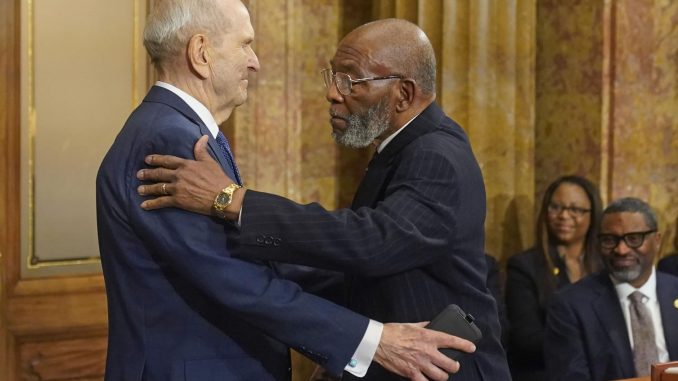
By Brady McCombs @BradyMcCombs – (For more visit www.christiancentury.org) -Top leaders from the Church of Jesus Christ of Latter-day Saints announced $9.25 million in new educational and humanitarian projects on June 14 as they seek to build on an alliance formed with the NAACP in 2018 as part of the faith’s efforts to improve race relations.
The Utah-based church will donate $3 million to fund scholarships for three years for Black students through the United Negro College Fund and give $250,000 to create a fellowship for students from the United States to travel to Ghana to learn about slavery, said church president Russell M. Nelson at a news conference in Salt Lake City.
Nelson made yet another plea for people to root out “the ugly sin of racism” during his prepared remarks as he continues to make racial justice a priority since assuming the top post in 2018, overseeing the faith of 16.5 million members worldwide.
“Leaders of the church have found common ground with the NAACP as we have discussed challenges that beset some of God’s children,” Nelson said. “We have considered specific things we might do to alleviate problems and improve the future of some who are currently in distress. We know our limitations. The challenges are huge, and our capacities are limited. But together we want to make a difference, even though our efforts may seem relatively small.”
The LDS partnership with the civil rights organization is part of the church’s larger effort to improve race relations. Until 1978, it had a ban on Black men in the faith’s lay priesthood, rooted in the belief that black skin was a curse. The issue lingers as one of the most sensitive topics in the Mormon history.
The LDS Church doesn’t provide ethnic or racial breakdowns of its members, but scholars say Black people make up a small portion.
In 2013, the church put out an essay disavowing the ban and explaining the reasons behind it, saying it was put into place during an era of great racial divide that influenced early teachings of the church. The essay was lauded by many as an important step. Others wished it had gone further and included a formal apology.
The new programs come after a year of worldwide reckoning over racial injustice, triggered by the killing of George Floyd by a police officer in Minneapolis.
“In this environment where people seek to create otherness or tribalism, we can stand here today as a beacon of light,” NAACP president Derrick Johnson said. “If we can see the Christ in one another, we can start from a place of being open and understanding, start from a place to appreciate one’s uniqueness as their genius.”
Amos C. Brown, senior pastor of Third Baptist Church of San Francisco and the namesake of the fellowship to Ghana, delivered remarks that began with him complimenting Nelson for his leadership and calling him “my brother of another mother.”
Calling the United States a nation in crisis, Brown described the partnership as an opportunity “for a faith community in America to do more than just talk the talk, but walk the walk of telling the truth, of being trusting with each other, respecting the worth and dignity of everyone no matter how different they may be,” Brown said. “We’re on our way, and we ain’t going to let nobody turn us around.” —Associated Press

Be the first to comment